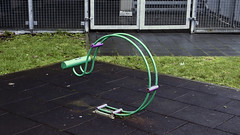Large music collections: form follows function
September 11, 2012 in digital music by Dan Gravell

I recently heard someone quoting the wonderfully alliterate phrase: form follows function. Funnily enough, it took the person some time to remember whether form did indeed follow function, or whether it was function that followed form.
For me, it’s a no-brainer. The utility, function of a product, be it anything from software, to a train, to a household appliance, is of paramount importance. Even if you want a magenta kettle to match your magenta kitchen tile splash-back, ultimately you want that kettle to boil water quickly and quietly.
The essence of the phrase is especially true for computer software. Software development should always be a response to a functional need. Where something doesn’t work as well as it could, software can fix the problem.
In the case of large music collections, for example, music is inevitably amassed over time: from different sources, collecting different metadata etc. As your home music collection gets bigger and better, the management of it gets harder. So how does form and function apply to music collections?
Function
I want to be able to access all my music quickly, when I want it. When I click 'play' my music must... play!
Form
My music collection must be easily navigable. I don’t want to encounter ugliness such as missing genres, inconsistent file names or misleading - or even wrong - cover art.
To illustrate my point, here are some of the key principles behind my home music collection and the rules that create a contented life.
Principle one: Consistency is clarity

One of the best things about my home music collection is its variety - don’t tell my wife but even some of her cheesy albums have ended up serving a purpose at house parties. However it’s often this variety that brings calamity. When music is sourced from different places, at different times the detail behind your music can become messy.
Mess is one thing. But inconsistent mess is the worst. What I mean here, is that I could probably live with some mistaggings in my collection if the mistakes were consistent throughout. But they rarely are. And as more music is added over time, new and different mistaggings arise. Eventually you have a potential maze of information to sort through, which is un-necessarily complicated and confusing.
By introducing rules software, like bliss, to create consistency, you can set a standard for your current collection, whilst also ensuring that any additional content follows the same rules. The best thing is that this can then be done automatically as well, on an ongoing basis. This allows you to stand back, reflect on your collection, build on it and listen with ease.
Principle two: Forever fixing
By using rules based software, the function of ‘staying fixed’ is made easier. This is because any rules that you configure start working behind the scenes on your behalf long after you have issued the rule.
There are other options, such as using a music player to organise your music. However your music player may not allow you to fix multiple functionality, for example renaming an entire genre whilst padding track numbers. Also, you may only be fixing the problem for that music player. If you have more than one music player (home stereo, MP3 player, mobile phone etc), you’re likely to have to fix problems for each type of player.
For example, you may want 'all album art to be above 500x500 pixels' because you like high resolution art. As you add new music, rules based software, like bliss, will alert you if this rule gets broken, and potentially fix it for you. With a music player, you would have to remember what your minimum acceptable resolution is and proactively check all of your music.
So, rules based software for me is the best way to ensure you fix problems across your entire music collection, at source; and ensure they stay fixed. This is important because as your music collection grows, you will find different issues that you want to fix. If you’re anything like me, you may even change your mind about the structure and other details over time as you learn more about music management.
I’ve heard an analogy that managing a music collection is like gardening. In that if you stay organised doing little by little, it’s easier and quicker to keep it in good shape and fit for purpose.
Principle three: Believe in backups
 I don’t know how many times I’ve warned friends and family who have “precious” photos or recordings to back their files up. Fortunately not everyone has experienced a crisis with their hard drive, or a virus or even an accidental deletion of files - losing months, or even years, of memories and work. I have, and I didn’t lose any files – simply because I regularly back up.
I don’t know how many times I’ve warned friends and family who have “precious” photos or recordings to back their files up. Fortunately not everyone has experienced a crisis with their hard drive, or a virus or even an accidental deletion of files - losing months, or even years, of memories and work. I have, and I didn’t lose any files – simply because I regularly back up.
For me, to lose my music collection, or even part of it, would be to lose all the time I've put into building it: searching, downloading, ripping, organising. When you consider all that time potentially being wasted, surely that's motivation enough to backup?
Now the really simply way to achieve this would be to use a external USB disk/stick. That would be better than nothing at all. However there are more sophisticated options.
Most NAS servers boast backup features as standard. If you don’t have a NAS, you can configure a backup routine from your computer to the Internet. Amazon S3 is an example of a cheap online storage solution which is generic; you can also find backup solutions bundled with computer security software. I use rsync.net to backup from my Linux home server.
These are just some of my truths about music management, and how to make it so much easier and enjoyable. There are many more.
I encourage you to think creatively and to be inspired to create the best music collection you can. Invest time - but only as much time as you need to. Use tools such as bliss to help you on your journey. It’s what it was designed for. Its form followed its function.
Thanks to glasseyes view, A Guy Taking Pictures and Ardonik for the images above.

